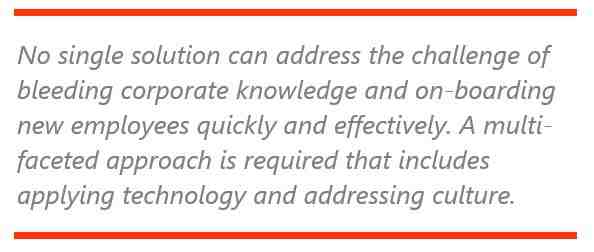

For over a decade, companies have watched as their most experienced employees retire. Complicating this, the transitioning  workforce of younger workers demands that companies change how knowledge is captured and disseminated. Some companies have responded with a patchwork of measures, but most are behind the trend and struggling to catch up.
workforce of younger workers demands that companies change how knowledge is captured and disseminated. Some companies have responded with a patchwork of measures, but most are behind the trend and struggling to catch up.
No single solution will address the challenge of bleeding corporate knowledge and on-boarding new employees quickly and effectively. Fortunately, there are several solutions available to address this problem. As such, a multi-faceted approach is required that includes applying technology and addressing culture. Various technologies enable companies to capture knowledge and institutionalize it, allowing the knowledge to stay with the company and be leveraged for the future workforce.
Labor shortages define the current job market and have for several years now. The news is replete with stories of unfilled positions, but the pool of truly qualified applicants is too small. In the US, an average of about 10,000 baby boomers turn 65 each day based on research from the Pew Research Center. That estimate was to hold from 2011 until 2029. From this population, many skilled and knowledgeable workers are reaching a pivot point in their career. Most retire, though some choose to work well into their 70s, but not at the same job. We’ve now reached a point where Generation X is beginning to enter retirement age.
Complicating this exodus of knowledge, industrial companies now compete with Google, Microsoft, Amazon, and other tech giants for talent. Many software companies have begun hiring seasoned professionals as well as college graduates to build solutions for the industrial companies who need the same skills. According to a recent report from the IMF, the tech talent shortage will reach 85 million tech workers by 2030. Economies to be hit hardest include Brazil, Indonesia, and Japan, which could each face shortages of up to 18 million workers, according to projections from management consulting firm Korn Ferry. The US and Russia are expected to be short of 6 million workers each, while China could face a deficit of 12 million.
TalentWise (acquired by Sterling) estimated in 2016 that as much as 70 percent of company knowledge leaves with an employee. This can affect company culture and workflow. Couple this with information from the Society for Human Resource Management that states employers will need to spend the equivalent of six to nine months of an employee’s salary to find and train their replacement. That means an employee salaried at $100,000 will cost the company anywhere from $50,000 to $75,000 to hire and train a replacement if they find one.
When it comes to younger workers, employers experience new challenges. According to CareerBuilder.com, the average time spent at a job for GenY (Millennials, age 26 to 41) is only 2.75 years. The news from Generation Z is a bit worse at 2.25 years; however, GenZ is significantly newer to working. Contrast that with GenX at just over 5 years of service at a given job.
In 2006, due to corrosion in a pipeline at the Prudhoe Bay oil platform, nearly 900,000 liters of oil escaped into the ocean. The responsible company, BP, didn’t find the leak until five days later. Due to the necessary repairs, massive quantities of oil could not be delivered for days, resulting in fuel shortages at American gas stations. In the fall of 2006, the US Congress demanded to know what led to the incident. According to the testimony, a qualified employee with specialized knowledge had left the company and, due to other priorities, was not replaced. A gap in knowledge had caused millions of dollars in damages. This oil catastrophe shows that a lack of knowledge management can be very expensive.
ARC Advisory Group clients can view the complete report at ARC Client Portal
If you would like to buy this report or obtain information about how to become a client, please Contact Us
Keywords: Knowledge Capture, Artificial Intelligence (AI), Machine Learning (ML), Procedural Automation, Workforce Automation, Predictive Analytics, Prescriptive Analytics, ARC Advisory Group.

